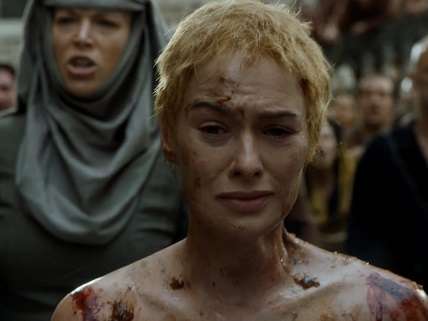Game of Thrones' Fifth Season Was Too Damn Depressing
Endless misery leads to low-stakes storytelling.


The fifth season of Game of Thrones wrapped up last night with an unceasingly bleak final episode. (SPOILERS FOLLOW). After committing the appalling crime of sacrificing his daughter on Melisandre's command, Stannis Baratheon loses half his army and discovers that his wife has killed herself. The red priestess abandons his cause, his forces are annihilated in battle, and Brienne of Tarth shows up to collect her vengeance and kill him.
Arya exacts some vengeance of her own, but the sheer amount of gore makes it difficult for the viewer to take much satisfaction. And it quickly leads to worse consequences for the character.
Jamie Lannister enjoys a brief heartfelt moment with his daughter, Myrcella, before an assassin's poison does its work. She dies in his arms.
Halfway across the world, the Mother of Dragons can't convince her scaly offspring to whisk her back to her city. Instead, a horde of Dothraki find her. It's unclear what they might do with her, but her prospects don't seem promising. As a prisoner of the warrior-nomads, Daenerys is right back to where she started in season one.
Cersei Lannister endures nearly ten minutes of on-screen humiliation. The single "happy" note at the end of this sequence is the revelation that Cersei's maester has created a silent, unfeeling Frankenstein's monster to protect her.
At Castle Black, Ser Davos encounters a broken Melisandre and learns of the utter defeat of Stannis's army. And then Jon Snow is betrayed and stabbed to death by his previously loyal men—not unlike his predecessor, Jeor Mormont, and his father, Ned Stark.
Frankly, it was too much darkness.
I say this as someone who has read, and loved, all of the Game of Thrones books, even the much-maligned fourth and fifth entries. I understand perfectly well that much of the horror on display here was preordained by George R. R. Martin, who set out to create a faithful medieval epic that does not spare readers from the misery of being alive prior to the nineteenth century. Jon Snow's death, for instance, happened much the same way as it did in the books—though it carried a note of greater finality here than it did on the page. (While death is not always the end in the books, the show has been reluctant to resurrect seemingly dead characters—leading me to believe that Jon Snow and Stannis are indeed dead, contrary to the expectations of naïve viewers.)
But unlike previous seasons, the showrunners really one-upped the books in terms of pure horror at every chance they could. They altered the Dorne plotline so that Myrcella could die and make Jamie's life a little worse. They put Sansa in peril—again—and let her be raped by Game of Thrones' most reliable sadist. They introduced Stannis's affections for Shireen just so they could make him burn her in an agonizing, unwatchable scene. None of these things have happened yet in the books; I expect they either won't happen, or will happen in ways that make more sense than they did here.
Indeed, many of these horrors made no sense in context. Why would Sansa willingly walk into Winterfell, knowing perfectly well what was in store for her? Why would Myrcella's killer choose that moment to strike, when it places the Dornish Prince Trystane at risk of retaliatory killing? How did the Boltons so effectively incapacitate Stannis's army, and why did Stannis—known for unshakeable resolution—resort to fire magic at the very first sign of trouble?
My complaint with this season is that the showrunners put shock before sensible storytelling. Having executed Ned Stark in season one and offed his wife and son at the infamous Red Wedding in season three, D.B. Weiss and David Beinoff seem to have a pathological need to top themselves in terms of pure carnage, even when the plot doesn't demand it.
Take Arya killing Ser Meryn. It wasn't enough for her to hate him and want revenge. No, the showrunners needed to reveal his even darker side—he's a serial sexual abuser of children—and have Arya kill him in the bloodiest way possible.
Look, I enjoy watching characters get revenge. I understand that sexual violence was commonplace in the medieval world, and depicting it is not tantamount to endorsing it. I get that Martin's vision is explicitly grittier, and more realistic, than other fantasy epics: heroes don't always win, light doesn't always defeat dark.
But when the good guys always lose, or are always shown to be bad guys themselves, or are gratuitously killed, raped, or maimed… well, the show loses some of its stakes. It's difficult to remain invested in the supposed "song of ice and fire," when everyone is always burning or freezing, with no hope in sight.

Show Comments (179)